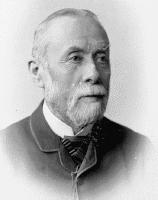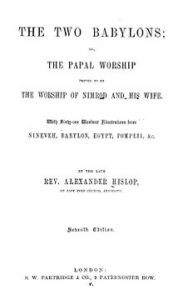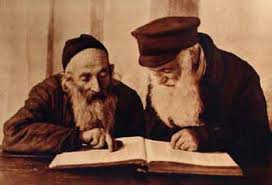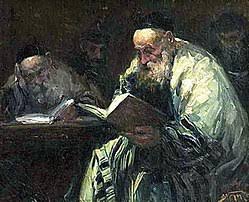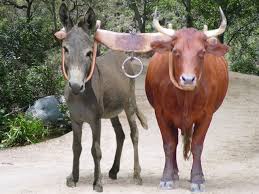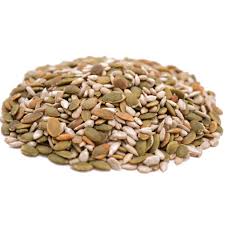Review of Parts 1 and 2 of this Series
Over the course of the last two installments of this series, we have been laying the groundwork for assembling our portrait of the Apostle Paul prior to his conversion.
In the first two-installments we discussed:
- Why it is important to our exploration of Paul and his writings to gain as much of an understanding of his pre-conversion life as possible.
- The first-century C.E. world of the apostle.
- His upbringing.
- Paul’s rabbinic education.
- His vocations and careers.
- Paul’s Roman citizenship.
- His personality and even his personal appearance.
Additional Background Information on the Pre-Converted Apostle
Since posting parts one and two, I have continued to study the pre-converted life of the Apostle Paul. Most of the additional information I have come up with during this time is within the domain of what we have already covered in those first two-parts. However, some of this additional information I feel is important to have for purposes of broadening our understanding of Paul the pre-converted man; the Jew; the rabbi; the scholar; the lawyer; the business man; the teacher; the apostle to both Jew and Gentile.
Again, without this foundational information in our tool-belts, it becomes somewhat challenging to understanding some of what Paul wrote concerning key elements of our Faith. So I wish to share this additional information with you now and then move on over to a discussion of Halakah and how Paul tapped this essential Hebrew principle to help his readers navigate the “One True Faith Once Delivered.”
Paul’s Upbringing
Paul’s upbringing in Tarsus made him somewhat familiar with “maritime transport, commerce, the cultural diversity of caravans and crews of workers from the most diverse origins, each with their particular differences in appearance, clothing, language and culture (Rod Carmona).”
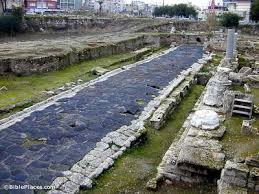
Paul’s upbringing in Tarsus granted him educational opportunities and Roman citizenship–essential elements to Paul’s success as an apostle to the Gentiles.
Tarsus was multicultural, yet a Roman city. It was the capital of the Roman province of Cilicia. Linen, wool and animal hides served as the primary basis for manufacturing in the region.
Compare and Contrast
I found it quite interesting that a good number of Pauline scholars and writers boldly compare and contrast Master Yahoshua’s upbringing with that of the Apostle Paul.
As I mentioned in the previous two-postings, it is widely accepted that the young Yeshua and Paul were contemporaries. They were likely born about the same time, give or take a year or two difference.
Both were raised in strict, orthodox Jewish homes. They no doubt both attended their respective local synagogues. Each was circumcised on the 8th day of their respective lives according to Torah and Jewish tradition (Gen. 17:12; 21:3,4; Lev. 12:3; Luk. 1:59). It’s a fair bet that both were bar mitzvahed sometime between their 13th and 14th years.
These are the comparable aspects of their respective upbringings. (Note: I have some uneasiness comparing and contrasting Paul to Yeshua. Yeshua is the most unique human being to ever grace this planet for all the obvious known reasons. But for the sake of framing Paul within a defined period of history—critically important to the creation of our biographical portrait of him–I’ll simply touch upon their similarities and differences strictly for reference.) You will agree that the contrast between the two are striking:
Paul’s family most likely was part of the Jewish dispersion or Diaspora–the scattering of Hebrews over the centuries to the Gentile nations of the world by the various conquering nations that came against Israel. The Jews of the Diaspora were directly affected by the cultural influences of their “surroundings than that which Yeshua would have experienced living in Palestine.”
Yeshua was raised in Palestine while Paul was raised in metropolitan Tarsus of Cilicia. Thus, Yeshua’s world-perspective was strikingly different than that of Paul. Paul was raised in a thriving, international metropolitan city. He no doubt had opportunities to travel. Paul was obviously exposed to innumerable cultures and languages. Yeshua on the other hand, was raised in first-century C.E. Palestine proper where He no doubt received the customary, basic Jewish training that every Jewish male child received. His surroundings would have been pastoral or suburban. He grew-up in an extremely slower pace of life than that of his contemporary in Tarsus. Yeshua interacted exclusively, with a handful of rare exceptions, with Jews. (Stalker; pg. 22; paragraph 2).
Given Paul’s secular trade of goat-skin tent-making; the common practice of Jewish fathers passing down their secular trades to their sons; given that he was brought up in Tarsus of Cilicia—a robust metropolitan city teeming with commerce and trade—it is very likely that Paul’s father was a successful merchant. We know from Paul’s own writings that Paul’s secular vocation would benefit him immensely at certain times throughout his ministry. Conversely, it is generally accepted that Yosef—Yeshua’s step-father—passed down to Yeshua the family trade of carpentry (whatever carpentry turned out to be in Master’s case). Interestingly, Mark 6:3 is the only suggested mention of Yeshua’s background as a carpenter. All indications are that Yeshua came from humble means as evidenced by the type of offering that was presented at the Temple by Yosef and Miriam on the 8th day of His life (Luke 2:24; cf. Leviticus 12:2-8; 2 Corinthians 8:9).
Paul was likely classically trained. Some have surmised that he received formal secular education from the University of Tarsus. Furthermore, we know that Paul received rabbinic training in Jerusalem at the school of Hillel.(I’ll speak more to this aspect of Paul’s pre-conversion life in just a moment.) Yeshua on the other hand, received his education and training from his step-father Yosef and his mother Miriam, and from his local synagogue. (We know that He really received his fullest training and education from His heavenly Father.)
Paul’s Two-Prong Education
Starting with his childhood, pre-rabbinic training, centrally located in Tarsus of Cilicia, it can be confidently concluded that Paul was trained at home and at his local synagogue. This is training that every Jewish child receives. It is a carry over and continuation of the command that Torah be passed down to every Hebrew child, especially to every first-born son.
It has been highly speculated and postulated by many bible scholars that Paul attended the renowned University of Tarsus. The University of Tarsus was known as the 3rd “most important educational center of his time, only exceeded by Athens and Alexandria, and especially recognized for its school of rhetoric.”Support for this contention comes from the fact that Paul “makes 2 or 3 quotations from the Greek poets” in his writings (Stalker; pg. 26; paragraph 2):
Menander—Acts 17:28—the first part of verse 28 comes from Cretica by Epimenides, and the second part of the verse from Hymn to Zeus, written by the Cilician poet Aratus.
Menander—I Cor. 15:33—”Do not be deceived: bad company corrupts good morals.” This is found in a play by Menander (4th-3rd century BCE).
Epimenides of Phaestus, or Gnossus in Crete, about 600 BCE—”One of themselves, a prophet of their own, said, ‘Cretans are always liars, evil beasts, lazy gluttons.’” (https://carm.org/did-paul-quote-paga-philosophers)
Thus, Paul would have received education in the classic Greek arts, which would serve to prime his intellect in understanding how the Greek mind worked. This was all the more relevant when it came to the art of polemics and reasoning which the Greeks excelled in. Otherwise, Paul’s preparation for being the Apostle to the Gentiles (as well as to the scattered Jews) would have been lopsided: he would have been ill-prepared to tackle and reason with the hardcore intellectuals he was bound to come across during his missionary journeys.
Besides the bestowing of the family secular trade upon Paul, the family saw fit to instill formal religious education upon him. This education, by no means was trivial or slight. It would prepare Paul for his spiritual work as a rabbi; a minister; a teacher; a lawyer of Jewish law (Stalker; pg. 24; paragraph 1).
The Jewish side of the equation, in terms of Paul’s education, would have been the training he received in Jerusalem. According to common Jewish practice, the advance, elite, exclusive Jewish training he would receive at the feet of Gamaliel in the School of Hillel would likely have begun at age 13. This could have possibly coincided with Yeshua’s time and visit in Jerusalem. (Stalker; pg. 27; paragraph 2).
Thus Paul began his rabbinic training which was lengthy and uniquely Jewish. Studies weren’t limited to just learning and study of Torah, the prophets and the writings. It would include extensive study of the writings and comments of the sages and masters. Much of both the Tanakh and the writings of the sages would be committed to memory. It would be during this time that Paul would learn the art of disputation, rhetoric and polemics. The method of instilling these lessons was arduous and involved a rapid fire of questions from the school’s various scholars and masters. This method of learning served to sharpen the students’ wits and enlarge their views of Judaism (Stalker; pg. 28; paragraph 2).
It is believed by many scholars that Paul’s text of choice was the Septuagint, as he quoted them “some 90-times in his writings…His use of the texts demonstrated a habitual contact and a profound familiarity with them (Rod Carmona).” Additionally, Paul possessed a mastery of “figures of speech” as evidenced in some of his writings.
Paul’s advanced rabbinic studies are clearly evidenced in the way he presented arguments and reasoned with his followers.
According to some Jewish websites I’ve come across, rabbinic education took upwards of 5-years to complete. If this was the case during Paul’s day, he probably would have been about 18-years of age at the completion of his rabbinic studies.
Did he remain in Jerusalem after graduation from Hillel School? Most scholars surmise that it was unlikely that he did. Some contend that Paul, like most other graduates of the various rabbinic schools, either returned to their homes and began work of some sort in their local synagogues or practiced in other localities throughout Palestine and even throughout the Roman Empire (Stalker; pg. 32; paragraph 1).
Let us keep in mind that if our theories are correct in terms of Paul being a close contemporary of Yeshua, Paul’s likely return to Cilicia to begin his rabbinic career would have coincided with the timing of John the Immerser’s and Yeshua’s ministries. Therefore, it is somewhat reasonable to conclude that Paul never met Yeshua nor John the Baptist in person.
Additionally, it stands to reason that Paul at some point soon after Yeshua’s crucifixion, returned to Jerusalem and maybe then was given a seat in the Great Sanhedrin (Stalker; pg. 32; paragraph 2). This makes sense given that Paul would have been at the proper age to assume the office; for the age requirement to sit on the council was 30.
Paul’s Rabbinic Training and Career
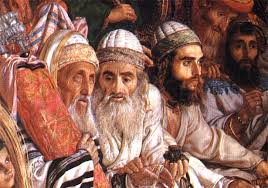
The Great Sanhedrin in Paul’s day was the equivalent of our U.S. Supreme Court today.
The Sanhedrin served the Jewish nation as her “principal judicial body (Rod Carmona).” It was headed by the ruling high priest. Its jurisdiction over the the Jewish people extended beyond simple religious matters. It also extended into virtually every conceivable civil aspect of Jewish life.
It is likened unto our Supreme Court. The council met on the Temple Mount in the Hall of Hewn Stones. They convened daily with the exception of Feast Days and the weekly Sabbaths. This council was composed of former high priest, levitical priests, scribes, pharisees, and representatives from prominent Jewish families in the city of Jerusalem (Wikipedia).
The Rabbis contend that the Sanhedrin is based on Exodus 18:21, 22; Deuteronomy 1:13; 17:9.
Positions were often political appointments.
Little known fact-bomb I’m going to throw at you right now: There were 2-Sanhedrin organizations. There was the Great Sanhedrin, headquartered in Jerusalem. It was composed of some 71 members. Then there were the regional or synagogal Sanhedrins (formally referred to as the Lesser Sanhedrin). The Lesser Sanhedrins consisted of 23 members—generally locally appointed elders.
The attention of most New Testament believers, however, is placed on the Great Sanhedrin headquartered in Jerusalem.
By the time Paul would have assumed his seat on the council, Christianity was only a couple years old, growing quietly throughout Jerusalem. Despite their Messianic undergirding, the Jerusalem members of the Way Movement “attended temple worship, observed Jewish ceremonies and respected the ecclesiastical authority” (Stalker; pg. 33; paragraph 1).
Given Paul’s talent and intellect, he seems to have become a very influential member of the Great Sanhedrin. This is evidenced by the council granting him prosecutorial authority against the Jewish Messianic Believers immediately after the death of Stephen (Acts 8:3).
There seems to be no biblical evidence to suggest that Paul was ever married. We know, however, that Paul made a statement in one of his writings to the Messianic Assembly of Believers in Corinth that he desired that certain members of the body would be as he was: celibate (I Cor. 7:8,9).
Paul’s celibacy is odd. It was common for every pharisee to take a wife. This is because pharisees “took very seriously the commandment to multiply…To be married was almost an obligation to belong to the Sanhedrin or to have a high rank there” (Rod Carmona). Nevertheless, Paul seems to have successfully bypassed this common practice and tradition.
The Pharisaic Dilemma
The problem with pharisees was that they held so tightly to the letter of the Law (both the written and the so-called oral), leaving little to no room for the spirit of the Law. Consequently, “they placed barriers between the people and their God, instead of attracting them (Carmona).”
This stands as a perfectly good reason why Paul and the Sanhedrin became so intolerable of the burgeoning Way Movement. They could not envision any way that the Gospel Yeshua preached had any place within or beside Judaism.
Thus the Sanhedrin and Paul saw the growing Messianic Movement (ie., the Way) and Judaism as two, mutually exclusive entities that could not possibly coexist. Paul knew exactly what side he was on.
I mentioned in part 2 that Yeshua in no way matched the pharisee of 1st-century C.E.’s concept of Messiah. Judaism expected a triumphal, conquering king in their Messiah that would free them from their Roman overlords.
This disparity between Yeshua and Judaism’s concept of Messiah in great way fueled Paul and the council’s ire towards the Way members. Paul and his ilk were convinced that the Messianics were incurably mistaken about the Person of Yahoshua and as a group they had to be eradicated for the overall good and wellbeing of their nation and the Jewish religion (Phi. 3:6).
The zeal that Paul possessed fueled his persecution against the Palestinian Messianics. This was interesting because most of the Jews throughout the ANE did not fear the Messianics as the rabbis did. In fact, the Messianics were highly favored and respected by the Jerusalem Jews (Acts 8).
Paul Fit the Suit
As we can see in this overview of Paul, he was for all intents and purposes a universal soldier—to borrow the descriptor from a 1980’s/90’s movie that went by that name. He fit the suit perfectly for one who would become an international evangelist—prophet—teacher—overseer—apostle.
Looking back one last time to the city where he was raised, the Tarsus of Paul’s day would have been steeped in Baal-worship. No doubt Paul witnessed the evidence and outcropping of such worship. Yet it would clearly seem to any student of scripture that he remained unsullied. He stuck to his Jewish convictions. I guess one could assert that Paul’s Jewish life kept him insulated from the surrounding scourge of paganism (Stalker; pg. 23; paragraph 2). And I would submit that this was an essential requirement for him becoming the great apostle to the Gentiles that he is famously known for becoming. There was no chance then of him being of two-minds when it came to matters of Faith and commitment to Yehovah and to the Gospel that was given to him by his master Yeshua HaMashiyach.
There is, however, that nasty little caveat that raises its head throughout portions of the New Testament we see played out in the lives of most devout 1st-century Jews. Every devout Palestinian Jew, especially those of the various Jewish sects of the day, were staunchly bigoted towards Gentiles (Acts 11:2; 10:28; Galatians 2:11-16). Clearly, this inbred bigotry stems from a twisting of Torah where Father commanded the Hebrews to not intermarry or conduct business with pagan, enemy nations. The pharisees took these Torah instructions to a whole other level when applying them to their lives (Deuteronomy 7:2,3). Father sought, through these commends, to insulate His people from all pagan influences and to assist them in living holy, righteous lives. Father never meant for His people to be hateful and vicious in their quest for holiness and righteousness. Unfortunately, this is the pathway that the pharisees and scribes were leading the Jews of the first-century C.E.
I believe that Paul’s upbringing as a Jew of the diaspora/dispersion and being the son of a likely successful merchant in the bustling, affluent, commerce-driven city of Tarsus of Cilicia, conditioned Paul to be more accepting of those not of his Jewish culture. None of what I’m saying here is to insist that Paul did not possess the required amount of bigotry that we see displayed by first-century pharisees. What I am saying, however, is that Paul’s upbringing played a role in him becoming the well-traveled emissary of the Kingdom of Yehovah that we all have come to know and love (and in some cases hate).
I appreciate what one expert of the apostle wrote concerning this issue of Jewish bigotry: that Paul’s conversion served to prove the power of the Faith facilitated anyone “overcoming the strongest prejudices” and establish its own unique brand and purpose (Stalker; pg. 8; paragraph 2).
So from an international sense related to delivering the Word of Truth, Paul handily fit the bill, or fit the suit to borrow from an old movie where one of the Mercury astronauts was said to have been selected primarily because he best fit the space suit and space capsule.
When we compare and contrast Paul to the 11-inner circle of disciples turned apostles, the inner circle of disciples would have naturally been ill-equipped to engage the world in intellectual discourses related to Yeshua and the Work of the Gospel. Yet we find from our study here that Paul was uniquely qualified for such an international ministry.
Was the inner-circle disciple’s ill-preparedness for international evangelism a bad thing? Absolutely not! The inner circle disciples served a unique purpose and role in launching the Faith movement from their base in Jerusalem. Without them, the Way Movement would have not gotten off the ground and Paul would have been simply a small voice of Truth in the midst of a huge pagan-based world.
Indeed, the inner circle disciples served a vital role in the Work of the Gospel. They served the role that Father in His infinite wisdom established for them to play. Their role was confined primarily to delivering the Gospel to their own people and the lost sheep of Israel (Matthew 10:6; Romans 15:8). They would have especially appealed to Jews of their social class (Stalker; pg. 10; paragraph 2).
So the inner circle of disciples were not schooled (ie., they were not lettered) as Paul was. Yet it was in the various places of education that Paul was afforded (ie., Jewish home training, his synagogal training, the University of Tarsus possibly, and the Hillel Rabbinic School), that he “learned how to arrange and state and defend his ideas.” Stalker suggests that Paul’s intellectual gifts helped him provide us the “best explanation of Christianity” that the world currently possesses. The writer takes the bold position of suggesting that Paul’s ministry was actually a continuation of Messiah’s own teachings (Stalker; pg. 12; paragraph 1).
The Apostle Peter broke the ice, so to speak, related to Jewish prejudice towards Gentiles with the conversion of Cornelius and his family (Acts 10). Despite Peter’s attempts to convince the Jerusalem Council “of the perfect equality of Jew and Gentile and apply it without flinching in all its practical consequences,” we find that none of the inner circle apostles had the intellectual capacity to complete the breakdown of the cultural and religious wall that stood between Gentile and Jew. These were Galilean fishermen, “fit enough to teach and preach within the bounds of their native Palestine,” but not sophisticated enough to take their message to the great international cities of the world. The task required “a man of unlimited versatility, of education, of immense human sympathy and breadth” to deliver the goods, so to speak. It required a man “who could not only be a Jew to the Jews, but a Greek to the Greeks, a Roman to the Romans, a barbarian to the barbarians—a man who could encounter not only rabbis in their synagogues, but proud magistrates in their courts and philosophers in the haunts of learning—a man who could face travel by land and by sea, who could exhibit presence of mind in every variety of circumstances and would be cowed by no difficulties.” Again, we see clearly that Paul fit the suit (Stalker; pg. 13; paragraph 3).
Paul was able to escape the confines of established rigid Jewish biases towards Gentiles and “accept the equality of all men in Messiah, and applied this principle relentlessly in all its issues” (Stalker; pg. 15; paragraph 1).
Some see Paul’s work as a continuation of Yeshua’s earthly ministry. And to a great extent I agree with that contention. I agree with this contention, not from the standpoint of some who hold that Yeshua’s earthly ministry was limited in time and region, but from the standpoint of Father’s plan. Father does everything He does according to His timing and purpose. Yeshua had a specific mission. The disciples turned apostles had specific missions. Paul’s mission, on the other hand, was much more expansive in terms of time and region—years as opposed to months; nations as opposed to one central region (Stalker; pg. 15; paragraph 1).
The 11-disciples turned apostles never saw Paul coming. They saw, however, a need to replace Judas Iscariot. Thus they prayed and following Jewish tradition, cast lots to determine who would replace Judas. “Matthias was chosen” to become the 12th apostle. Little did this group realize, but Matthias, as nice a guy as he may have been, was not Master’s choice to be Judas’ replacement. Like some others, I truly believe it was Master’s intention to make Paul the 12th apostle, as evidenced by the fact that beyond his selection, we never read another word about Matthias in the Holy Writ.
Some contend that the Apostle Paul could not possibly be an apostle because he did not meet the conditions that Peter established for apostleship (Acts 1:21, 22). Paul was not a direct follower of Yeshua. In fact, Paul was a persecutor of the Messianics in Palestine. He was an accomplice to Stephen’s martyrdom and “a fanatical persecutor and tormentor of Christians (Rod Carmona)”
Paul the Thinker
The one of many significant character traits, as described by James Stalker in his book entitled “The Life of St. Paul, was Paul’s intellect. Stalker described Paul as having “immense mental stature and force” (Stalker; pg. 8; paragraph 1).
By virtue of what we know of his upbringing, education and as evidenced in his writing and writing style, we can competently conclude that Paul was the consummate thinker. Throughout his writings we get a clear sense that he was always sorting out in his mind how best to approach and work through each particular situation and problem that was put to him.
Paul’s “thinker” persona plays hand-in-hand with the Hebrew concept of Halakah that he brilliantly crafted into his discipling of the various converts to the Faith that he mentored. (We’ll get into the concept of Halakah from Paul’s perspective in just a moment.)
Stalker describes Paul as “a born thinker.” Paul’s mind went beyond that of just having a cognitive understanding that Yeshua was the Son of Yehovah. He was compelled to dig deeper and explore the elements of this enormous Truth to such a degree that he would be capable of explaining what all of these Truths meant to the end user. (How many millions of people throughout the world today have a cognitive understanding that Yeshua is the Son of God, but beyond that, have absolutely no understanding of what that reality truly means to their lives and to the world?)
Of Paul, Stalker continues: “It was not enough for him to believe that Messiah died for sin: he had to go farther and inquire why it was necessary that He should do so and how His death actually took sin away.”
Thus, Paul was devoted to the cause of Messiah for the remainder of his life in the most “exhaustless” manner which made him the great “Thinker of Christianity” we know him to be (Stalker; pg. 11; paragraph 3).
Paul and the Hebrew Concepts of Halakah
So we are now done discussing Paul’s biographical background. I now want to shift gears somewhat and begin a brief discussion about an important aspect of our Faith that Paul was instrumental in delivering to the world during his ministry.
It’s important that we come to an understanding of the Hebrew concepts of Halakah and Agadah. We will find that these two concepts play significantly in Paul’s ministerial work and is seen in his writings—especially in those pesky hard to understand passages of his.
Defining Halakah
Halakah, according to the Talmud, is what the rabbis say a Jew’s conduct—behavior—must be. Bear in mind, the writers of the Talmud are coming from a purely Judaistic perspective. The rabbis may lead one to conclude that the concept of Halakah (and agadah for that matter) are uniquely Jewish concepts. However, we will see that Halakah and Agadah are concepts derived from our Heavenly Father and were delivered to us through His Torah; then taught to us by the prophets of old, Yeshua, Paul and the inner circle apostles.
Halakah according to Strong’s Exhaustive Concordance means to walk; to go forth; to follow.
The root of the Hebrew word is strongly associated with the concept of someone leading another by the hand or training someone to perform a specific task.
We often speak of walking out our Faith. The Biblical “walk” so to speak is directly linked to the practice of a Father laying the palm of His hand upon the head of his son and leading him in the way he should go. This leading of the son in the way he should go involved the father teaching his son how to live according to the ways of God as well as it involved instilling upon the son the family trade. This was a perpetual thing that went down from the father to the children and so forth in perpetuity. There would be no adjusting or changing of what was originally put forth. The truths passed down to each generation had to remain perfectly in tact.
This was how Yehovah always intended that our society would exist and remain true to His ways. Throughout Torah we find father commanding the Hebrews to teach their children His ways:
“Remember the day you stood before the LORD your God at Horeb, when the LORD said to me, ‘Assemble the people to Me, that I may let them hear My words aso they may learn to 1fear Me all the days they live on the earth, and that they may bteach their children.’ (Deu 4:10 NAU)
aYou shall teach them diligently to your sons and shall talk of them when you sit in your house and when you walk by the way and when you lie down and when you rise up. (Deu 6:7 NAU)
“aYou shall teach them to your sons, talking of them when you sit in your house and when you walk along the road and when you lie down and when you rise up. (Deu 11:19 NAU)
“Now therefore, awrite this song for yourselves, and teach it to the sons of Israel; put it 1on their lips, so that this song may be a witness for Me against the sons of Israel. (Deu 31:19 NAU)
The responsibility for instilling proper behavior throughout an individual’s life was not given over to the schools and teachers like we see happening in our 21st century western society. Father always intended the responsibility to rest solely upon the shoulders of the parents. The buck ultimately stopped with the father of the family to ensure that this was accomplished. We don’t see that happening today much in our society.
In the days of the Patriarchs, it was incumbent upon the children to take up the mantle/profession of the father, especially the firstborn son. Now, recall that we looked at this in our biographical discussions of Paul. We saw that Paul took up the mantles/professions of his father that included being a goat-hair-tent-maker as well as being a pharisee.
Brad Scott—a well known and highly respected Hebrew Roots teacher—extensively covers this concept of Halakah and Agadah, especially as it relates to Paul and his teachings. Scott cites Luke 4 as giving us details of Yeshua accompanying his parents on a trip to Jerusalem. Yeshua was probably about 13 years old—bar mitzvah age. You know the story: Yosef and Miriam depart Jerusalem, no doubt heading back to Nazareth when they realize Yeshua was not with them. Yosef and Miriam return to Jerusalem. They find Yeshua in deep conversation with the Jewish sages and teachers in the Temple. Miriam and Yosef scold Yeshua for not staying with them as they departed.
Our young Master responded to them that He would be about His Father’s business.
In Judaism, when a male child reaches Bar Mitzvah age, part of the ceremony calls for the boy to state to those in attendance that he would then begin being about his father’s business. In other words, that child would then assume the profession of his father (Luke 2:49).
In Yeshua’s case, He was stating to his parents that He would be about His heavenly Father’s affairs.
Now, I disagree with Brad Scott where he contends that Yeshua was stating to His parents that He would be about both His heavenly Father’s business first, then His earthly step-father’s business second. Contextually, this does not make any sense to me. Yeshua is speaking about being in the Temple setting about the work that Yehovah had given Him to do.
Regardless if we buy into Scott’s perspective on this story or not, I do fully agree with Scott that this story is an excellent example of the Halakah root principle—that of a son being led to learn the ways of life directly from and by His father.
Paul, in acting as a father to the assemblies he oversaw, wrote that they remember the ordinances as he passed them down to them (I Corinthians 11:2).
Circling back, parents are essential to the training up of their children in the ways of Yehovah. This is what Biblical halakah is all about. And this is the mindset that we see employed by Paul in his approach to teaching and correcting the assemblies that he oversaw.
Paul said, follow me as I follow Messiah (I Corinthians 11:1).
This principle was not only seen demonstrated in Paul’s ministry. We also so this repeated time and time again in our Master’s earthly ministry. Yeshua said:
So Jesus said: When you have lifted up the Son of man, then you will know that I am He and that I do nothing of my own accord. What I say is what the Father has taught me; (Joh 8:28 NJB)
Joh 5:19 Then answered Jesus and said unto them, Verily, verily, I say unto you, The Son can do nothing of himself, but what he seeth the Father do: for what things soever he doeth, these also doeth the Son likewise.
Joh 12:49 For I have not spoken of myself; but the Father which sent me, he gave me a commandment, what I should say, and what I should speak.
Joh 12:50 And I know that his commandment is life everlasting: whatsoever I speak therefore, even as the Father said unto me, so I speak.
Likewise, Yeshua taught His disciples how to walk out the Faith. He taught them how to pray, heal and teach and preach the Gospel. And when He was about to leave, He promised his disciples that He would not leave them as orphans, but He would always be with them as well as send them the comforter—the Ruach HaKodesh—the Holy Spirit (John 14:18).
The ancient concept of the Master-Disciple relationship was one where the disciple imitated his/her master. In so doing, the disciple would over time grow into the image of his/her master. This is the point that Paul is trying to get across to the Corinthians in his 1 Corinthians 11:1. I used to think that Paul was crossing the line somewhat by putting himself in such a prominent position in his followers’ lives. I felt Paul should be pointing his followers only to Yeshua. However, I now realize that Paul was coming purely from the perspective of the ancient near east Master-Disciple relationship. This passage then was a clear example of the concept of halakah.
Another prominent example of the Halahkic principle or concept is Torah. The instructions given to Moshe that were written on stone by Yehovah is essentially halakah: these are the instructions on how to walk; how to live. Those instructions of course were passed down to us by our heavenly Father.
So then, Biblical halakah is seen as instructions on “how to walk” or live out one’s Faith. It’s what you do in response to your commitment to your chosen Faith. It is doing what you see demonstrated.
_______________________________________________________________________________
And with that we will conclude this 3rd installment of our series on Paul and Hebrew Roots. In Part 4 I wish to explore the concept of Halakah a little more, especially as it relates to Paul and his teachings and writings. Then, I want to introduce the Hebrew concept of Agadah. We will see how Paul’s teachings and writings beautifully employed in perfect concert both concepts.
I want to thank you for fellowshipping with me here today. I was blessed putting this thing together and presenting it to you, as much as I was blessed by your presence with me here today.
Please bless me with your edifying comments. Let me know how this series is blessing and informing you.
Until next time, may you remain blessed and secure in Father’s perfect will for your life. May you walk steadfastly in the power and might of His Ruach HaKodesh.
Shalom and take care.
References:

